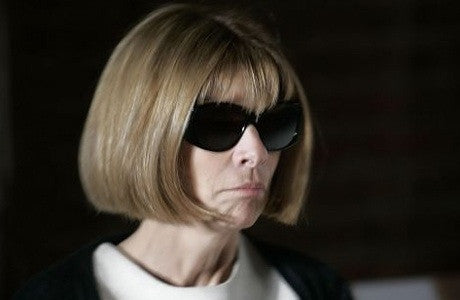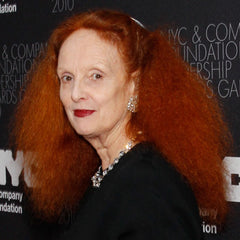
The Empress's New Clothes
About a year before opening Better Dresses Vintage, I serendipitously received a free one-year subscription to Vogue. I'd never been a subscriber, and read it very rarely. But I figured it couldn't hurt to give the magazine a close look now, if only to see what colors, silhouettes, and other trends were going to be hot, and stock my shop accordingly. In the process, I reasoned, I could gain valuable insight into the fashion industry.
I already bought (and enjoyed) the occasional copy of InStyle at the supermarket checkout. But as everyone knows, Vogue is, and for more than a century has been, the true and singular arbiter of fashion. InStyle reports the trends; Vogue sets them. Where InStyle is attainable, or at least approachable, Vogue is pure fantasy (yes, there are people who buy the very designs that walk the runways. But most of us shop at the local mall, not the couture ateliers of the Faubourg Saint-Honoré).
With my first free issue on its way, I sat down at the computer to stream "The September Issue." I'd already added the documentary to my Netflix queue back when, but now it felt more urgent that I see it. Compulsory, even. So, I watched.
The fascination with Anna Wintour baffled me. I never for a moment felt that "oh, I would so love to meet her" feeling you get when you learn of a fabulously talented, innovative, courageous, or influential woman. Thing is, the esteemed editor in chief just didn't seem to be, or to be having, much fun.
Oh, she looked the part, sartorially speaking. Pulled together nearly to the point of internal injury. And to be fair, my Google image search did turn up some photos of her smiling. But this one better represents what I saw in the movie. Not someone you want to cross. A demeanor ideal for a prison warden or a dictatorial head of state. But isn't this supposed to be fun? We're talking about clothes and accessories here, not incarceration and coups d'etat.

Even more puzzling to me was Creative Director Grace Coddington. Yes, she's a creative type, and yes, we all have the right to wear our hair as we please. But come on, now.
 Coddington on the cover of British Vogue, August 1962
Coddington on the cover of British Vogue, August 1962

A recent photo of Coddington, now in her 70s.
Ms. Coddington specializes in creating otherworldly scenes we are expected to long to inhabit. She is, in essence, telling us what style is and what we should want to do with it. Yet, she walks around looking as if she's just removed her finger from an electrical outlet.
I'll admit this is unkind on my part, and a particularly personal bugaboo. I fork over large chunks of not-so-disposable income to tame my own mass of unruly frizz. And I do this at regular intervals, with a nearly indescribable sense of relief. I send up prayers of gratitude to the inventor of the wondrous chemicals involved. (Perhaps when I'm 70, I'll find the inner strength, or outer laziness, to let my hair go natural. Then again, I won't have Ms. Coddington's face to take up the style slack, so perhaps not.)
These two powerful, influential, and undeniably talented women -- and the fascinating contrast between them -- set me thinking in an atypically deliberate manner about fashion, style, and trends. I made a mental note to look very closely at my year's worth of free magazines. Surely they would have things to teach me.
That year is now up. And I've come to the following conclusion:
I do not like Vogue Magazine. I can appreciate it. But I do not like it.
I rarely felt compelled to tear out and save a page. In contrast, I have binders full of inspiration, ideas, and wish list items torn from InStyle. The few times I thought "Wow, I really like that" while reading Vogue, I was looking at a throw-back piece from Banana Republic's Mad Men collection or a similar homage to mid-century loveliness.
I cannot say I derived any enjoyment from perusing my year's worth of Vogue. And if browsing through a fashion magazine isn't pleasant, why bother? It's not a chemistry textbook you must slog through before the final exam. It's supposed to make you smile, daydream, pine, dare. I hadn't thought it was meant to irk.
Unlike Carrie Bradshaw's experience of Vogue, which bordered on religious ecstasy, my overall emotional response was, in a crass nutshell, pissed off. Not angry enough to write a letter to the scowling editor, mind you, but annoyed enough to vigorously toss each subscription renewal notice into the recycle bin.
But why? Why did I have this strange and unexpected response? What was it, exactly, about this particular magazine that just bugged the heck out of me? I never felt the need to curse out loud while thumbing through InStyle. I might curse my thighs or my bank account, but I never felt animosity toward the publication. So what was going on here? Why wasn't reading Vogue any fun?
Because I found that the images in the magazine often evoked the same feelings in me as would an all-Bartok-and-Cage evening at the symphony or a night of tutu-free classical ballet. It's oh-so-avant-garde. All the cool kids get it. They relish the dissonance and flexed feet. They enjoy the "beauty in the ugliness" and are smugly satisfied by their reaction to it. But month after month I just kept thinking, "Hey, does anyone else notice that the emperor is naked!? Who would want to look like this?"
As with those factions of modern art, music, and dance that rub my fur wrong, I understand the concepts. Honest, I do. I even get the precept that any reaction is a good reaction. It makes you "feel something" and that's the point. It shakes you up. Makes you "aware you're alive."
For some, that's enough for it to be rewarding. "Look! It's making you angry! Isn't that cool?" Well, no. I've got my kids, husband, and computer to handle that. I don't need my wardrobe or my art to join in. As with the inexplicable Rothkos hanging at MOMA, I Iook at it and think, "Really?" and feel just a teensy bit peeved.

Mark Rothko, Black on Maroon, 1958
Call me simple, unsophisticated. Call me a dilettante. But I want beauty. Isn't there enough unpleasantness in the world? If I want to see ugly, it's easy enough to find. Never mind poverty, crime, pollution, disease. Heck, most of the time, I could just look in the mirror. What I want to see, to experience, and to feel, whenever and wherever possible, is beauty. I'm even willing to suffer for it.
I would happily endure torture by corset to remotely resemble this model* from the March 1949 issue of Vogue,


Beyond the leather gloves, even features, and slim figures, what do the two models have in common? For me, not much. The grace and elegance conveyed so convincingly by model Jean Patchett in 1949 are completely missing from the modern young lady, who could do with an etiquette lesson on how to sit while wearing a skirt.
What bothers me isn't so much the hair or the makeup, both of which are clearly and inexplicably intended to be odd rather than attractive. Nor is it the clothes or accessories, which I don't personally care for but which others may have already added to their wish lists. No, I think what offends me is the willful, intentional ugliness. It's the visual equivalent of snark. Mean, biting, not the least bit pretty, and proud of it. She's not meant to be lovely. She's not meant to be ladylike. And that is meant to be cool.
But when, and why, did unkempt and unrefined become synonymous with cool? When did ugly become the new chic? Am I really supposed to want to emulate this? Would sitting like a tired, long-haul truck driver and not washing my hair really get me in with the popular kids?
For me, this "fashion" adds nothing, improves nothing, accomplishes nothing beyond putting me in a foul mood (perhaps this, not hunger, explains why all the models look so grumpy).
In my eyes, I'm already plain. As my mother matter-of-factly pointed out, "There are no great beauties in our family." But a girl can, perhaps should, dream. Aspire. I want to do better. I want to feel pretty. Or at least prettier. Not prettier than you -- that's altogether different -- just prettier than me. And no, not just outwardly. But it's a start. And what's so uncool about that?
Yes, what constitutes beauty differs for each of us. But there happen to be certain universal truths. Trust me, I'm a philosophy major. We all respond to symmetry, to balance. It's not complicated, really. Break the golden ratio and the Project Runway judges will admonish you to "be careful about the proportions." Heidi and Nina aren't concerned with modesty. Michael isn't worried about wasting fabric. They're referring to aesthetics -- what makes it look pretty.
Would you agree that the enchanted swan (at top) is lovelier than the village bride (below)? To see a snippet of them in action, and hear the accompanying music, click the link beneath each photo.

Swan Lake (music by Tchaikovsky)
vs.

Les Noces (music by Stravinsky)
Don't know about you, but I'll take swans-and-Tchaikovsky over peasants-and-Stravinsky any day. And I'll take refined, elegant ladies in beautiful, flattering clothing over willfully vulgar, heroin-chic hipsters, too. Alas, I seem to be in a rapidly shrinking minority.
Don't believe me? At a recent ballet class, the 20-something instructor used Swan Lake as an epithet. Really. She slung the words at me precisely as a Republican might fling "liberal" at an opposing candidate -- with unabashed contempt. Even among ballerinas, apparently, pretty has become prosaic.
Tastes differ, sure. You might like bold, modern styles in jewel tones. Someone else prefers soft, flowing lines in pastels. But despite the differences, the goal is the same: to enhance, not detract from, the wearer. To make her look, and feel, more beautiful. Why has the goal shifted so radically, from pretty (whether elegantly refined, flowingly feminine, or sharply sophisticated) to sneering ugliness?
Vogue has always been about the avant garde. The cutting edge. The newest and most innovative. The unattainable (to most of us) ideal. And yes, it has always featured runway styles that would not easily fit into a suburban housewife's wardrobe. In the distant past I may have found Vogue compelling. Back when, even those over-the-top, unwearable designs had a unifying feature. The goal, the ideal, was beauty. But today's magazine leaves me cold.
Most galling is what I see as a missed opportunity. Every month, Ms. Wintour and her staff decide what fashion is and will be. Again and again, they've chosen to make it a sad, sarcastic, ugly affair.
Perhaps it's a form of self-preservation. "Grace, we'd better make ourselves and everything we do look terribly serious, indeed, before they figure out that it's just clothes we're talking about here." Are they attempting to imbue fashion with importance by denuding it of banal, provincial, silly beauty?
Thing is, they don't need to. Yes, it's only clothing. But what an impact it has on those of us not living in nudist colonies. We have to get dressed. It's a requirement. And what we wear, like it or not, affects how others view us. Most important, it affects how we view ourselves. As Isaac Bashevis Singer accurately observed, “What a strange power there is in clothing."
We've all experienced the uncomfortable feeling of being inappropriately dressed for an occasion, or the wonderful feeling of wearing an outift that highlights our assets and conceals our flaws. We've seen the transformative power of clothing on every episode of What Not to Wear. And I've yet to see Stacy or Clinton counsel a client to adopt a dour expression as part of the process.
Our garments affect how we feel. Fashion has the ability to lift (or lower) our spirit, to increase (or quash) our self-esteem. These, in turn, can change our lives -- for the better, or for the worse. It is important. Every month, the editors at Vogue choose surly and slovenly as the new ideal. Wouldn't pulled-together and pretty be the more responsible message? The more desirable goal?

* The lovely and talented Jean Patchett models a dress by mid-century designer Fira Benenson. And what do you know? We just happen to have one of Benenson's designs available right here at Better Dresses Vintage.

Comments
Oh my goodness! I thought I was the only one who felt this way about Vogue.
Every couple of years, I find myself buying one, just to look at the pictures, especially if they have a bit about historic art or fashion (like Nov 2006, with Kirsten Dunst on the cover). I’ve already learned the hard way you CAN’T read the articles without getting pissed off at the elitist snobbery (even if the article is not about clothing). I dislike the sad and starved models in contorted positions wearing weird clothes.
I do, however, like the ads. And some of the spreads aren’t too terrible. I analyze the ugly, pick out the beautiful parts and do my best to translate into something real and beautiful. Like, lately, I’ve been feeling into floppy hats and floral dresses a la the 70s, or short ones with boots like was popular in my early teen years in the 90s. One flip through the new Vogue tells me that’s whats coming into fashion (once I edit out the silliness).
I admit it. I loooove Vogue. I’ve devoured every scrumptious morsel of it since my teen years.
I found The December Issue a delectable little bonbon for this fashion obsessed girl. The time frame is interesting since it’s from back in 2007 - where Vogue’s editorial content and layouts continued to swell in response to the increasingly bloated number of advertising pages - rather than the reverse situation Vogue found itself in after the recession.
Nuclear Wintour came off slightly less dismissive than I anticipated - and I seriously wanted to slap some of the fearful yes women who surround her, changing their opinion with every perceived twitch in Nuclear’s face. But the real super hero of the film (and Vogue) is Grace Coddington. Although I had to resist the urge to lunge at the screen to apply a deep conditioner and flat iron to that hair, I was transfixed by her and her relationship with Nuclear. She seriously needs her own reality show. I’d have to go out and buy a TV if that were to happen.
